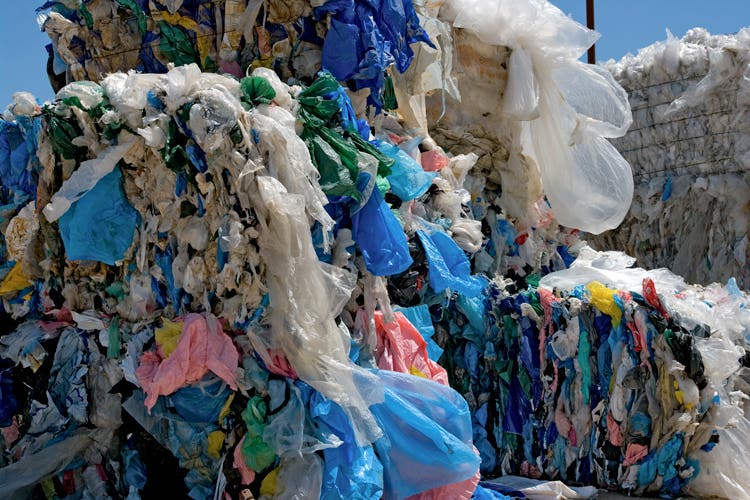Turning plastic grocery bags into sustainable fuel
More than 300 million tons of plastic waste are produced annually, which causes serious environmental issues because of plastic’s life cycle

[Nov 3, 2021: American Institute of Physics]
Producing biofuel using only three renewable and naturally abundant source ingredients: carbon dioxide, solar panel-generated electricity and light. (Credit: Oleksiy Mark/Shutterstock.com)
More than 300 million tons of plastic waste are produced annually, which causes serious environmental issues because of plastic's life cycle and the difficulty of eliminating it.
Consequently, most plastic waste ends up in either a landfill or the ocean. A significant number of plastics break down into microplastics, which are ingested by fish and other marine life causing havoc to marine ecosystems.
In Journal of Renewable and Sustainable Energy, by AIP Publishing, researchers from California State Polytechnic University report using catalytic pyrolysis to turn plastic wastes into a valuable fuel source. Pyrolysis is the thermochemical decomposition of carbon-based matter in the absence of oxygen.
Related Stories
Researchers focused on recycling plastic and upgrading plastic into other products or converting it to a vapor with heat, which met a catalyst and turned into the desired fuel-like product. This pyrolytic process transforms primary organic waste into a sustainable fuel or other valuable chemical.
"The innovative part of the experiment is the catalyst," said author Mingheng Li. "The catalyst is critical to this particular pyrolysis process, because it only requires one step to get to the desired fuel product at relatively mild temperatures."
The catalyst was prepared by dipping a zeolite substrate in an aqueous solution containing nickel and tungsten and drying it in an oven at 500 degrees Celsius. The synthesized catalyst was used in conjunction with a lab-designed, single-stage pyrolytic reactor, which ran at a set point of 360 C to break down a mixture of plastic grocery bags.
The catalytic process used in this experiment on plastic waste could also be used to process other wastes, such as manure, municipal solid waste, and used engine oil, to make usable energy products.
"This pyrolysis process serves as a definitive step in reducing reliance on fossil-based fuels," said Li.
The researchers found the pyrolysis product was very similar to a standard diesel fuel product via gas chromatographic analysis, a type of chromatography used in analytical chemistry for separating and analyzing compounds that can be vaporized without decomposition.
Going forward, the team will work to explain the cracking mechanism that occurs on the surface of the catalyst. In addition, they will try to optimize diesel fuel production from various mixed plastic wastes.
The article "Catalytic production of diesel-like oils from plastic wastes" is authored by Michael Arnold, Baron Boghosian, and Mingheng Li. The article appeared in Journal of Renewable and Sustainable Energy on Nov. 2, 2021 (DOI: 10. 1063/5.0066218) and can be accessed at https://aip.scitation.org/doi/full/10.1063/5.0066218.
For more environmental news stories check out our Green Impact section at The Brighter Side of News.
Like these kind of feel good stories? Get the Brighter Side of News' newsletter.
Tags: #Green_Good_News, #Research, #Plastic_Bags, #Recycle, #Packaging, #Waste, #Clean_Fuel, #The_Brighter_Side_of_News
Joseph Shavit
Head Science News Writer | Communicating Innovation & Discovery
Based in Los Angeles, Joseph Shavit is an accomplished science journalist, head science news writer and co-founder at The Brighter Side of News, where he translates cutting-edge discoveries into compelling stories for a broad audience. With a strong background spanning science, business, product management, media leadership, and entrepreneurship, Joseph brings a unique perspective to science communication. His expertise allows him to uncover the intersection of technological advancements and market potential, shedding light on how groundbreaking research evolves into transformative products and industries.



